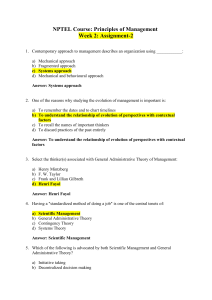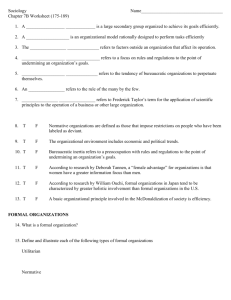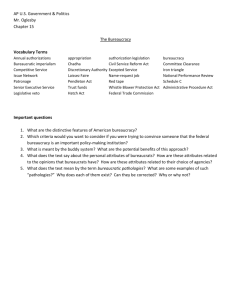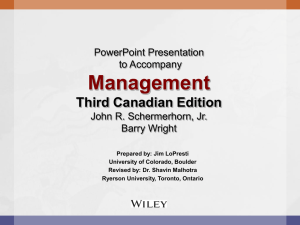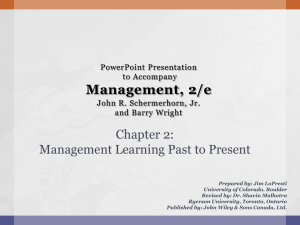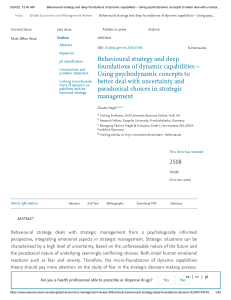Chapter 2 - MissIfe-BOH4M-SOC
advertisement
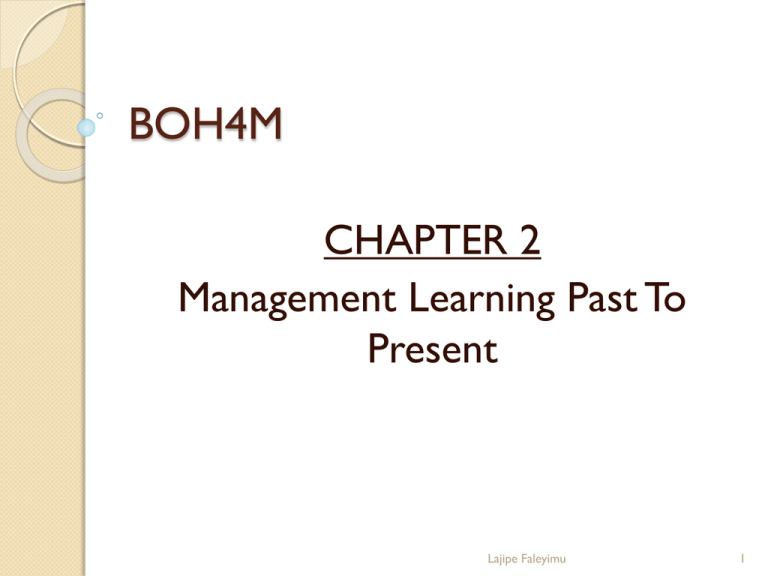
BOH4M CHAPTER 2 Management Learning Past To Present Lajipe Faleyimu 1 CHAPTER OVERVIEW What can be learned from classical management thinking? What are the insights of the behavioural management approaches? What are the foundations of modern management thinking? Lajipe Faleyimu 2 Classical Management Approaches SCIENTIFIC MANAGEMENT – emphasizes careful selection and training of workers and supervisory support. Lajipe Faleyimu 3 Administrative Principles Division of labour Authority Discipline Unity of command Subordination of Individual Interests Remuneration Centralization Scalar Chain Order Equity Personnel Tenure Initiative Esprit de corps Lajipe Faleyimu 4 Classical Management Approaches BUREAUCRACY – rational and efficient form of organization founded on logic, order and legitimate authority Lajipe Faleyimu 5 Classical Management – Bureaucratic organizations Characteristics of Possible bureaucratic organizations: disadvantages of bureaucracy: ◦ Clear division of labour ◦ Excessive paperwork or “red tape” ◦ Clear hierarchy of authority ◦ Formal rules and procedures ◦ Impersonality ◦ Careers based on merit ◦ Slowness in handling problems ◦ Rigidity in the face of shifting needs ◦ Resistance to change ◦ Employee apathy Lajipe Faleyimu 6 BEHAVIOURAL MANAGEMENT APPROACHES Figure 2.2 Foundations in the behavioral or human resource approaches to management Lajipe Faleyimu 7 Figure 2.3 Maslow’s hierarchy of human needs. Lajipe Faleyimu 8 BEHAVIOURAL MANAGEMENT APPROACHES McGregor’s Theory X assumes that workers: • • • • • Dislike work Lack ambition Are irresponsible Resist change Prefer to be led McGregor’s Theory Y assumes that workers are: • Willing to work • Capable of self control • Willing to accept responsibility • Imaginative and creative • Capable of self-direction Lajipe Faleyimu 9 MODERN MANAGEMENT FOUNDATIONS ◦ Quantitative analysis and tools ◦ Systems view of organizations ◦ Contingency thinking ◦ Commitment to quality ◦ Learning organizations ◦ Evidence-based management Lajipe Faleyimu 10 MODERN MANAGEMENT FOUNDATIONS 21st Century Manager • Managers have to excel as never before to meet the expectations held of them and of the organization they lead. Attributes of a 21st Century Manager • Global strategist – understanding the interconnections among nations, cultures and economies • Master of technology – comfortable with information technology • Inspiring leader – attracting and motivating workers to achieve high-performance culture • Model of ethical behaviour – acting ethically in all ways Lajipe Faleyimu 11 REVIEW: MANAGEMENT LEARNING PAST TO PRESENT Should Weber’s notion of the ideal bureaucracy be scrapped, or is it still relevant today? How can a manager, even today, benefit from the Maslow’s needs theory Can system and subsystem dynamics describe performance problems for an organization in your community? Lajipe Faleyimu 12
